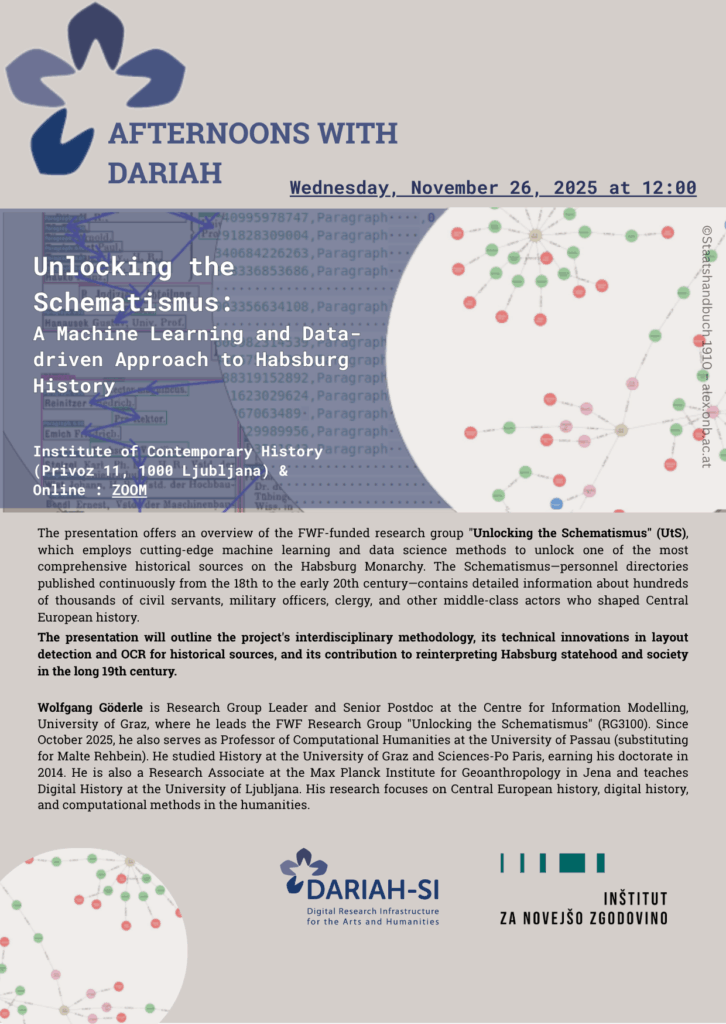We cordially invite you to the first lecture in the series “Afternoons with DARIAH,” dedicated to exploring new research, tools, technologies, and methods in the field of digital humanities. The lecture will take place on Wednesday, November 26, 2025, at 12:00 p.m. at the Institute of Contemporary History.
As part of this lecture, we will host Dr. Wolfgang Göderle from the University of Graz, who will present his work on the project “Unlocking the Schematismus”, in which he will outline the project’s interdisciplinary methodology, its technical innovations in layout detection and OCR for historical sources, and its contribution to reinterpreting Habsburg statehood and society in the long 19th century.
The lecture will be held in English and will also be available online via the Zoom link.
You can read more about the content of the lecture and the lecturer below.

Where: Institute of Contemporary History, Privoz 11, Ljubljana (lecture room, Zoom)
When: Wednesday, November 26, 2025, at 12:00 p.m
Unlocking the Schematismus: A Machine Learning and Data-driven Approach to Habsburg History
Abstract:
This presentation offers an overview of the FWF-funded research group “Unlocking the Schematismus” (UtS), which employs cutting-edge machine learning and data science methods to unlock one of the most comprehensive historical sources on the Habsburg Monarchy. The Schematismus—personnel directories published continuously from the 18th to the early 20th century—contains detailed information about hundreds of thousands of civil servants, military officers, clergy, and other middle-class actors who shaped Central European history.
The research group brings together historians, digital humanists, and data scientists from the University of Graz, TU Graz, and the University of Vienna in an ambitious five-year endeavour. The project pursues three key objectives: developing novel machine learning methods for extracting structured information from complex historical documents; creating a comprehensive semantic knowledge graph to represent and visualize this data; and producing new, data-driven historical insights into the Habsburg middle classes, social mobility, institutional evolution, and the transimperial dimensions of the monarchy.
This presentation will outline the project’s interdisciplinary methodology, its technical innovations in layout detection and OCR for historical sources, and its contribution to reinterpreting Habsburg statehood and society in the long 19th century.
About the lecturer:
Wolfgang Göderle is Research Group Leader and Senior Postdoc at the Centre for Information Modelling, University of Graz, where he leads the FWF Research Group “Unlocking the Schematismus” (RG3100). Since October 2025, he also serves as Professor of Computational Humanities at the University of Passau (substituting for Malte Rehbein). He studied History at the University of Graz and Sciences-Po Paris, earning his doctorate in 2014. His research focuses on Central European history, digital history, and computational methods in the humanities.
Göderle has successfully secured over €2.5 million in competitive research funding as Principal Investigator, including several FWF projects. He is also a Research Associate at the Max Planck Institute for Geoanthropology in Jena and teaches Digital History at the University of Ljubljana. His research combines historical expertise with advanced computational approaches to analyze large-scale historical datasets and develop new methodologies for digital humanities research. He has published extensively on Habsburg history, administrative structures, and the application of machine learning to historical sources.
